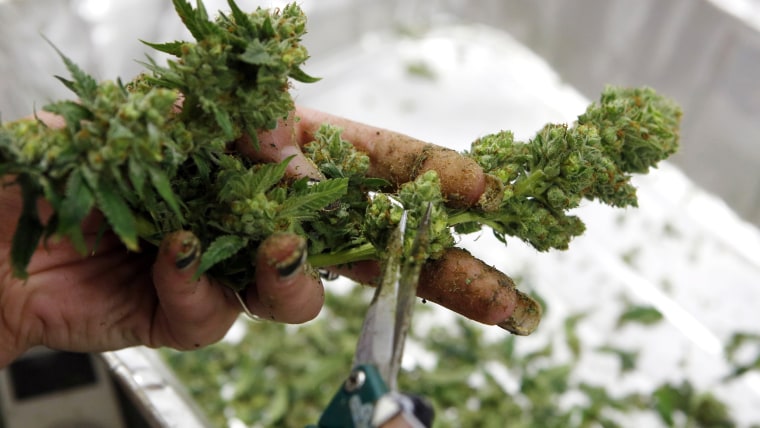In retrospect, former first lady Nancy Reagan made the parental “pot talk” a bit easier with her "Just Say No" anti-drug message of the 1980s.
But now that marijuana is legal in both Washington state and Colorado, parents are finding that talking to kids about pot is a more complicated conversation. Many are wondering: Should we focus more on responsible use, like families and schools do when discussing alcohol use?
President Obama told the New Yorker that he doesn’t think smoking marijuana is “more dangerous than drinking alcohol.” However, he added: “It’s not something I encourage and I’ve told my daughters I think it’s a bad idea, a waste of time, not very healthy.”
For the most part, Colorado parents seem to share the president’s attitude. As more licensed marijuana shops pop up, parents are telling their kids the retailers are no different from liquor stores.
“The new laws have changed the way I plan to talk to my kids,” says Stephanie Sprenger of Arvada, Colo., an author and mother of two girls, ages 2 and 7. Sprenger appreciates the comparison between pot and alcohol use and recently wrote a blog post asking: Will marijuana become the new go-to coping resource for stressed parents? Writes Sprenger:
"I suspect that within a few short months, all the trendy local boutiques will be stocking retro aprons with mottos such as 'Pot is the new red wine.' Or instead of picturing wineglasses full of merlot captioned with 'Mommy's sippy cup,' there will be a tasteful glass pipe atop the words, 'Mommy's Pacifier.'
“My older daughter knows I like to drink a glass of wine, so I look at this as an opportunity to have a more nuanced conversation about moderation and context,” Sprenger explains. She said she actually welcomes the pot talk as relatively straightforward, compared to explaining things like school shootings and other difficult parenting topics she has to cover with her children these days.
For blogger and author Lori Holden of Denver, legalization hasn’t changed the way she talks about pot with her 12-year old daughter and 10-year old son. It has, however, given her more opportunities to talk about substance abuse versus moderate use.
“As the kids are reading more things like 'green health' everywhere,” Holden says, “we can’t not talk about it. Just like we talk about people they see getting drunk on television, for example.” Holden tells her children that she does not condone getting high when they are young — and points out that from a health perspective, there's a difference between taking a drink and taking smoke into your lungs.
Families of teens are getting more chances to discuss substance abuse, too. Parents in Issaquah, Wash., recently held a forum to discuss how to talk about legalization with students, reports NBC 5 Seattle. “Everyone should be worried because when you have a lot more access, you have a lot more use,” Issaquah Police Chief Paul Ayers told NBC.
“For kids here now, the quote-unquote ‘drug culture’ is just a fact of life, like liquor stores or bars anywhere else,” says Zakary Watson, a Black Forest, Colo., mother of a 13-year old daughter and 6-year old son. She stresses that the streets have not suddenly become seedy or unsafe just because you might come across a pot shop while running errands with your family. “That said, I will drink a glass of wine in front of my kids, but I would never smoke a joint in front of them. That’s my personal preference.”
Watson plans to remind her children that pot, just like alcohol, is illegal for those under the age of 21. And she will point out the serious legal ramifications for underage users in terms of college acceptances and scholarships — much like the consequences for underage drinkers and arrests for DUI’s.
The "pot talk" can be hard for many of today's parents who may have used marijuana in the past, and aren't sure how to balance honesty with admonition.
Mark Wolfe, a San Francisco father of three daughters, ages 1 to 6, wrote a New York Times op-ed, “Pot For Parents,” about his experience with medicinal marijuana.
“I will freely admit to my own use as a college student and as an adult with a prescription,” Wolfe emailed TODAY Moms. As for telling his kids he smoked pot in high school? He’s still on the fence, illustrating how marijuana and alcohol may still have different stigmas associated with adolescent use.
Lori Helmstetter, a speech pathologist in Denver, finds the pot-alcohol analogy a “little oversimplified.”
As the mother of a 13-year-old boy (and stepmother of three adults in their 20s), Helmstetter says she wants to learn more about how different bodies react to marijuana, since she is not a pot smoker herself. “I want to be able to teach my son the same things I can about alcohol,” she explains, “from what happens to people when they drink too much, what the dangers are, and when he needs to get his friends help in a dangerous situation.”
Jacoba Urist is a health and lifestyle reporter in NYC. Follow her on Twitter @JacobaUrist.
